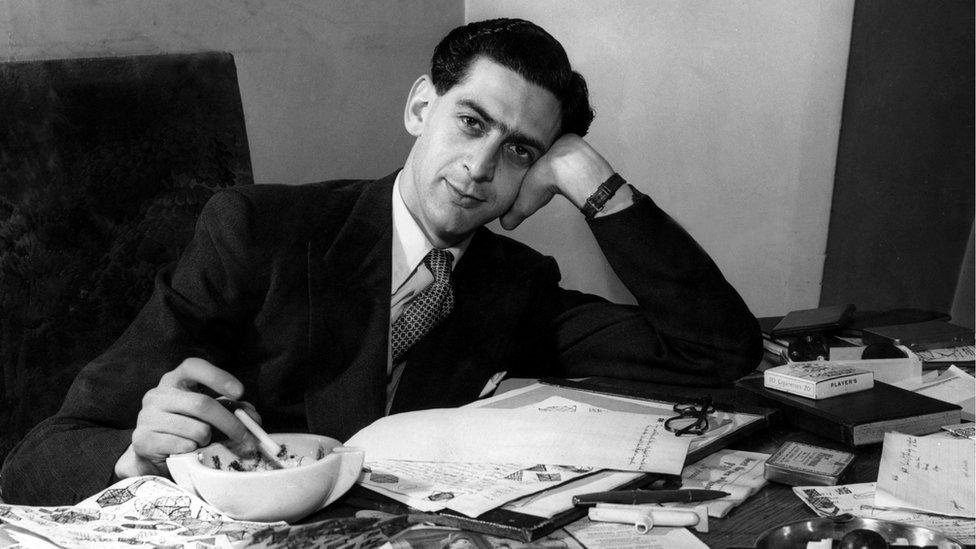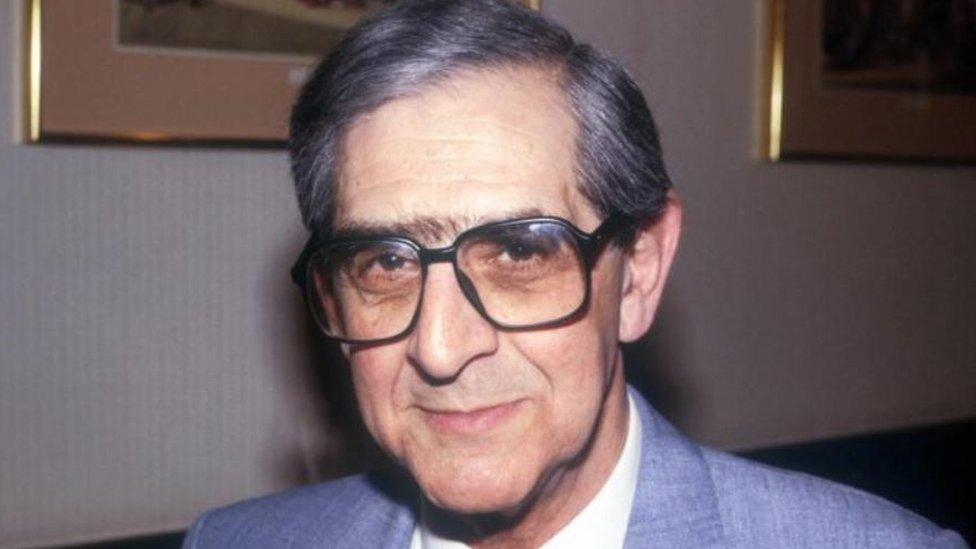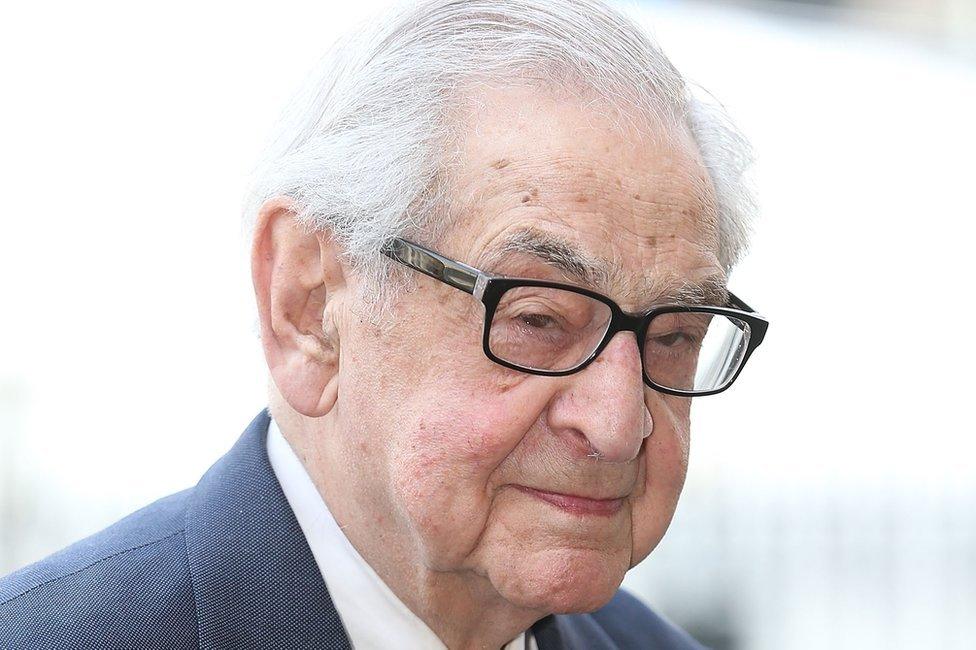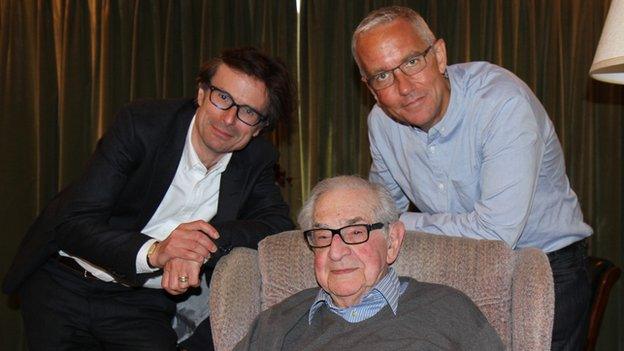Denis Norden recalls comedy pioneer early years
- Published

Denis Norden was a leading light of post-war British comedy
It is a decade since Denis Norden retired after a long career as a writer and broadcaster. To younger audiences, he's known as the host of It'll Be Alright on the Night, ITV's long-running series of compilations of TV cock-ups. But at 94, he's also perhaps the last survivor of the writers and performers who in the late 1940s reinvented radio comedy.
It is exactly three-quarters of a century since Norden first sold a programme idea to the BBC.
In August 1941, as a 19-year-old awaiting his RAF call-up, he somehow got the head of the BBC's gramophone department to accept a six-part series called Let's Go to the Holborn, about the variety theatre the Holborn Empire. They were the first of countless scripts he was to write for the corporation.
'Like Morecambe and Wise'
From 1947 until the early 1960s, the endless pressure of thinking up jokes was shared with Frank Muir, who died in 1998.
It's impossible to think of post-war British comedy without Muir and Norden. They were as important and as accomplished as Morecambe and Wise, though without the dance routines.
Muir and Norden were brought together by the writer Ted Kavanagh, as Norden recalls.
"In 1947, Kavanagh was the only comedy writer the British public had ever heard of," Norden says.
"He'd written It's That Man Again (ITMA), the big radio hit of the war years. Later he set up a settlement of writers and he decided Frank and I would work well together.
"Frank Muir and I had things in common - such as our shared RAF background - but we were also very different. Frank was a performer to his fingertips and would have made a wonderful light comedian."

Frank Muir (left) and Norden were very different characters but found they worked well together
Their first hit on radio was Take It From Here, which they wrote for a decade from 1948. TIFH, as the BBC called it, had some of the characteristics of wartime comedy.
But even the earliest Muir and Norden scripts almost always connect with the modern listener whereas a show like ITMA can feel like an historical document.
But Norden defends his old boss: "When Ted Kavanagh wrote ITMA the country was a monoculture and we all had the same experiences.
"So in a script he'll have a reference to a number eight battery - a notoriously unreliable battery the whole country struggled with in wartime. And the audience falls about laughing in a way which now feels inexplicable.
"And of course in wartime the public was listening almost entirely to the BBC so everyone knew all the characters and all the catchphrases."
Yet that word "almost", Norden says, has a lot to do with how radio comedy changed after the war.

Norden was the face of It'll Be Alright On The Night from 1977 until 2006
"In the forces we had access to high-powered radios which got the American Forces Network (AFN). The people who became writers and performers after 1945 had often spent the back half of the war listening to Bob Hope and Jack Benny. Ideas on comedy changed.
"Spike Milligan was someone influenced by the smart, wisecracking humour on AFN. And Galton and Simpson, though they're slightly younger.
"Until then there had been a deference to comedy. But on AFN you'd hear a sketch with, say, Hope and Crosby based around insult humour, and it encouraged writers to push further. It may not sound a radical change but it was."
Apart from US radio, and of course films, Norden recalls how influential American comic prose was. "James Thurber and SJ Perelman and Robert Benchley and [the Canadian] Stephen Leacock had an appeal to our generation of writers," he says.
"We loved getting smuggled-in copies of New Yorker magazine."
One of Thurber's line-drawings of a mournful bloodhound hangs on the wall behind Norden as he speaks.

Norden and Muir wrote the now largely forgotten In All Directions featuring Peter Ustinov
Later editions of Take It From Here can still be heard fairly easily so Norden is happy to discuss two less familiar series, which he and Muir wrote together.
In January 1949 they wrote a series called Third Division. It was the first comedy on the BBC's new Third Programme, the forerunner of Radio Three. Muir and Norden shared writing duties with Paul Dehn, who later wrote the film Goldfinger.
What leaps out today is the cast - including Peter Sellers, Michael Bentine, Harry Secombe and Benny Hill.
"We weren't given much guidance what the BBC wanted except that it shouldn't be like the Light Programme or the Home Service. It was a revue, to use a slightly old-fashioned term: we had two bands to provide the music," Norden says.
No recordings appear to have survived so only the typed script allows one sketch in episode two, transmitted on 2 February 1949, to be compared with another recording which appeared on vinyl in 1958.
The spoof travelogue Balham - Gateway To The South became Muir and Norden's best-known piece when George Martin re-recorded it for the Peter Sellers album The Best of Sellers.

Norden says 'almost all comedy is of its time'
By then, Sellers was a big star and provided all the voices, but in the BBC original he narrates while other roles are taken by Hill, Bentine, Secombe and others.
Sellers clearly admired Muir and Norden's writing: The same episode of Third Division provided the sketch Common Entrance on his follow-up comedy album in 1959.
Another early series now largely forgotten was In All Directions. It featured Peter Ustinov and Peter Jones and was made in a way which in the early 1950s was extraordinary.
The programme was constructed around the idea that the two men were looking for a road they could never find called Copthorne Avenue. But there was no script.
'Extraordinarily fertile brains'
"The two Peters would come to the office where Frank and I worked and we would give them a few ideas," Norden says.
"Then we would turn on a massive old clunking tape recorder and basically Peter and Peter would extemporise around the ideas: this could go on all morning.
"Then they left and Frank and I would listen through and decide what had worked and what hadn't. The next Monday we all met up in the BBC studio and we would get them to ad lib again but this time based around the notes we gave them from the previous session.
"What I've always regretted is that somewhere along the way the ad-lib tapes disappeared. Both the Peters had extraordinarily fertile brains and they would be a treasure trove today."
Sadly just a single edition of the series made it safely to the sound archives.
Third Division and In All Directions were both strikingly ambitious series, proving it wasn't only The Goons which struck off into new radio territory in the 1950s. So does Denis enjoy modern comedy on TV and radio?
"I'm not a great fan of the modern style of personal agonising which crops up a bit too often for my liking," he says.
"But I recognise the pure gold that runs in Andy Hamilton and Guy Jenkin's work for Outnumbered on TV. And on radio, I really enjoy John Finnemore.
"But almost all comedy is of its time. You can't expect audiences now to laugh at what amused people 60 years ago. But people do still enjoy Balham - Gateway to the South. So that's an achievement."

Follow us on Twitter @BBCNewsEnts, external, on Instagram at bbcnewsents, external, or email entertainment.news@bbc.co.uk, external.
- Published23 June 2015
